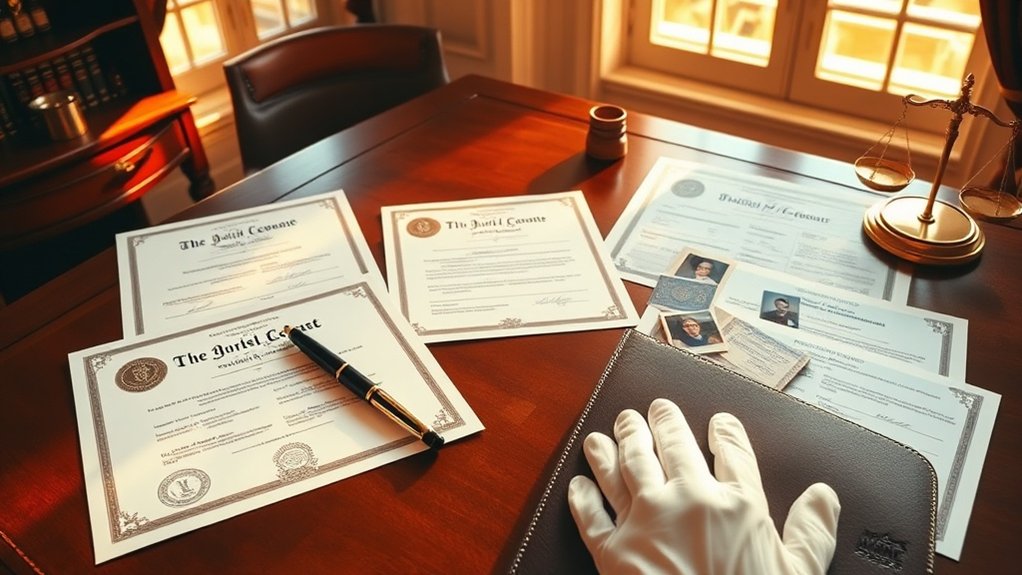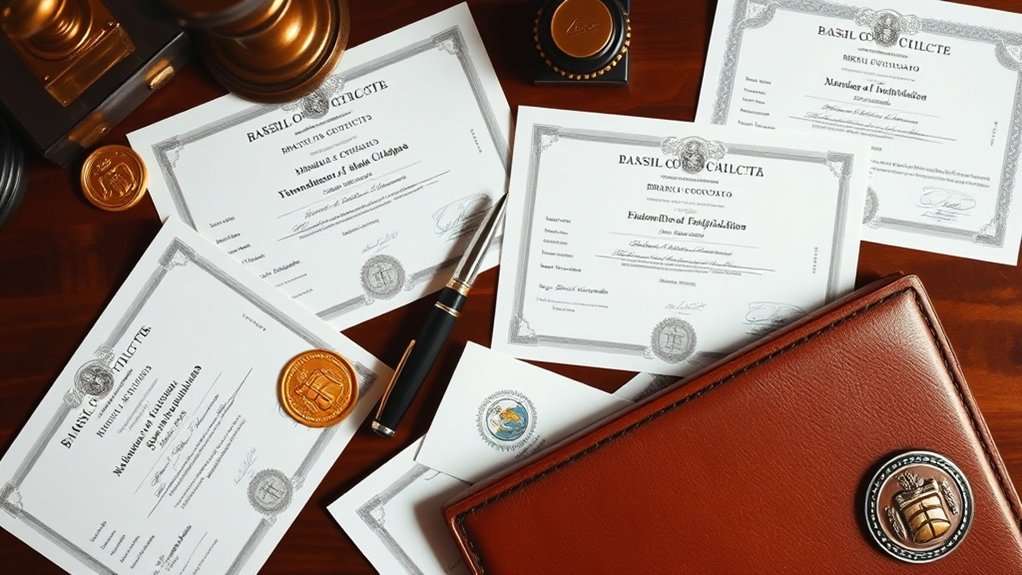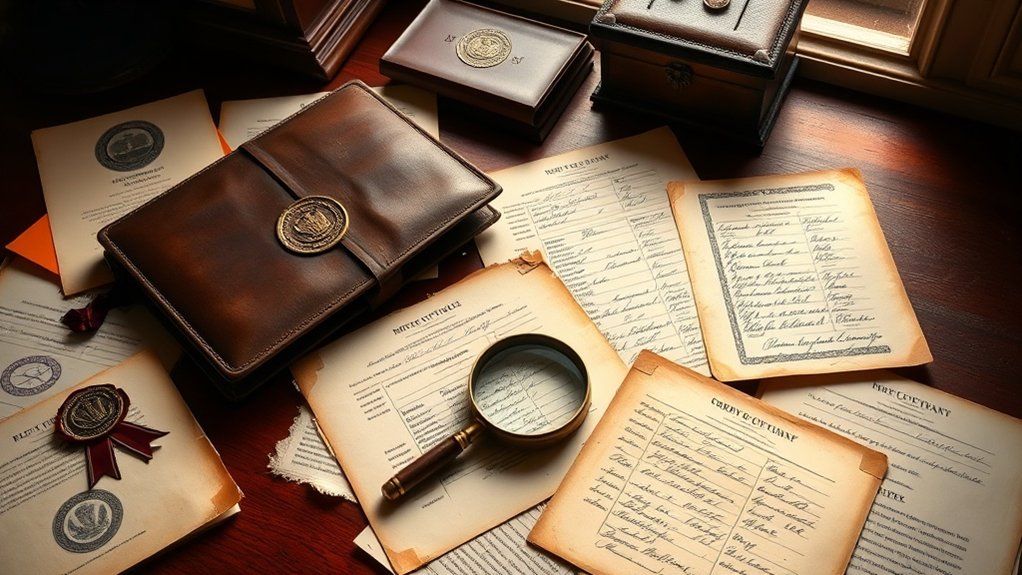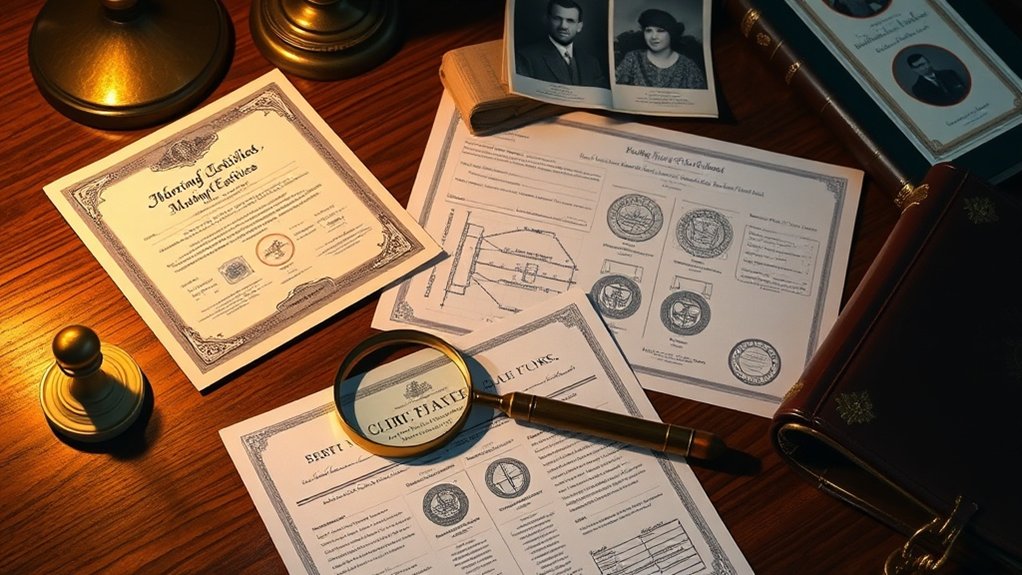You’ll need rock-solid documentation when proving dependent relationships for immigration purposes, and even minor gaps in your evidence can derail your entire case. Vieira Braga Advogados understands that marriage certificates and birth records aren’t just paperwork—they’re the foundation that determines whether your family stays together or faces separation. The challenge lies in knowing which documents satisfy legal requirements and how to handle the complexities that inevitably arise.
Understanding Legal Requirements for Dependent Relationship Documentation

When you’re required to prove a dependent relationship for legal purposes, you must provide specific documentation that meets stringent federal and state requirements. You’ll need certified copies of marriage certificates, birth certificates, and adoption papers that clearly establish your relationship to the dependent.
Immigration authorities and government agencies don’t accept photocopies or unofficial documents. You must obtain original certificates or certified copies from the issuing jurisdiction. If your documents are in foreign languages, you’ll need certified translations performed by qualified translators.
You’re also required to demonstrate financial support through tax returns, bank statements, and affidavits of support. Medical insurance records showing coverage for your dependent strengthen your case significantly.
Each agency has specific formatting and authentication requirements. You can’t assume one agency’s accepted documentation will satisfy another’s standards. Vieira Braga Advogados ensures your relationship documentation meets all applicable legal standards before submission.
Professional assistance minimizes common errors that could delay your application and helps ensure your documentation meets evolving immigration policy requirements.
Essential Marriage Certificates and Supporting Evidence
Since marriage certificates serve as the primary proof of spousal relationships, you’ll need to secure certified copies that contain all required elements for legal recognition. These documents must include both spouses’ full names, dates of birth, marriage date, and the issuing authority’s official seal.
You’ll also need supporting evidence to strengthen your dependency claim. Bank statements showing joint accounts, shared credit cards, and co-signed loans demonstrate financial interdependence. Insurance policies listing your spouse as beneficiary or joint policyholder provide additional verification.
Property documents revealing joint ownership, lease agreements with both names, and utility bills addressed to both parties establish cohabitation proof. Tax returns filed jointly for multiple years show ongoing financial partnership.
If your original marriage occurred abroad, you’ll need certified translations and possible apostille authentication. Keep multiple certified copies available, as different agencies may require original documentation that they’ll retain for processing.
Errors in forms or missing required elements can lead to delays and additional costs, making proper document preparation essential for successful immigration applications.
Birth Certificate Authentication and Verification Processes

You’ll need to authenticate your birth certificate through specific document legalization requirements that vary by country and jurisdiction. The apostille certification process streamlines international document verification by providing standardized authentication for countries that are part of the Hague Convention. Additionally, you must ensure proper translation and notarization of foreign-language documents to meet the receiving authority’s requirements. Incorrectly filled forms or missing documentation can lead to visa denials and significant delays in your immigration process.
Document Legalization Requirements
Although you’ve gathered all necessary birth certificates and relationship documents, these papers must undergo proper legalization before immigration authorities will accept them. This multi-step process ensures your documents meet international standards for cross-border recognition.
The legalization process typically involves these sequential steps:
- Notarization – A licensed notary public verifies signatures and authenticates document copies
- State certification – Your state’s Secretary of State office certifies the notary’s authority
- Federal authentication – The U.S. Department of State authenticates state-level certifications
- Consular legalization – The destination country’s consulate provides final approval for use
Each step requires specific fees and processing timeframes. You’ll need to plan accordingly, as rushing through legalization can delay your entire immigration case. Vieira Braga Advogados coordinates this process to prevent costly mistakes. Professional document translation services may also be required, as Brazilian authorities typically charge R$60-120 per page for translating foreign documents into Portuguese.
Apostille Certification Process
When countries participate in the Hague Apostille Convention, they’ve streamlined the legalization process through a single authentication certificate called an apostille. You’ll find this process significantly faster than traditional consular legalization, which requires multiple steps through various government offices.
To obtain an apostille for your marriage or birth certificates, you’ll submit your documents to the designated competent authority in the issuing country. They’ll verify the document’s authenticity and attach the apostille certificate, which contains standardized information including the country of origin, signatory details, and a unique identification number.
You won’t need additional authentication once you receive the apostille. Member countries automatically recognize apostilled documents, eliminating lengthy embassy procedures and reducing processing time from weeks to days.
Specialized legal guidance ensures you gather the essential documents correctly for your immigration application, preventing costly delays that could affect your residency or visa approval in Brazil.
Translation and Notarization
If your birth certificate isn’t in English, most immigration authorities and government agencies will require certified translations alongside the original documents. You’ll need to work with qualified translators who can provide accurate, legally-recognized translations of your vital records.
The translation and notarization process involves several critical steps:
- Certified translator selection – Choose translators certified by professional translation associations or court systems
- Document accuracy verification – Ensure all names, dates, and official seals are precisely translated without omissions
- Notarization completion – Have both original and translated documents notarized by licensed notaries public
- Translation certification – Obtain translator’s sworn statement confirming accuracy and completeness of the translation
This process ensures your foreign birth certificates meet legal requirements for immigration, marriage applications, and dependent relationship verification procedures. Specialized legal assistance from experienced immigration lawyers can help navigate the complex requirements for sworn translations and ensure all documentation meets official standards for your specific visa application.
Handling Missing or Incomplete Family Documentation

Since family documentation often gets lost, destroyed, or never existed in the first place, you’ll need strategies to establish proof of relationship through alternative means. You can request late registration of birth or marriage certificates from civil registry offices where the events occurred. If original records don’t exist, you’ll submit sworn affidavits from witnesses who can attest to family relationships under oath.
Church records often serve as valuable alternatives when civil documents are missing. Baptismal certificates, marriage records from religious ceremonies, and burial records can establish family connections. You should also gather school enrollment records, medical records listing family members, and old passport applications that reference dependents.
Census records and immigration documents frequently contain family relationship information. Military service records sometimes list next of kin or dependents. When multiple alternative documents consistently show the same family relationships, immigration authorities typically accept this cumulative evidence as sufficient proof of your dependent relationship claims. Working with immigration consultants can provide essential guidance on which alternative documents will be most effective for establishing family relationships in your specific case.
International Document Translation and Apostille Services
Before immigration authorities can accept your foreign documents as proof of dependent relationships, you’ll need certified translations into the official language of your destination country. Professional translation services ensure accuracy and legal compliance for your marriage certificates, birth records, and other family documentation.
The apostille process authenticates your documents for international use under the Hague Convention. This official certification verifies the document’s legitimacy and the authority of the issuing institution. Without proper apostille certification, foreign governments won’t recognize your family documents.
Key requirements for international document processing include:
- Certified translations by qualified, court-approved translators
- Original apostille stamps from your document’s country of origin
- Notarized copies of all translated materials
- Complete documentation chain showing relationships between family members
Vieira Braga Advogados coordinates both translation and apostille services, ensuring your dependent relationship documentation meets all international legal standards for immigration proceedings. Specialized legal support becomes crucial when gathering essential documents like proof of income and valid passports for visa applications.
Common Challenges in Proving Complex Family Relationships

While straightforward parent-child or spousal relationships typically require minimal documentation, you’ll face significantly greater hurdles when proving complex family structures. Adoption cases present particular challenges when original birth certificates aren’t available or when multiple countries’ legal systems are involved. You’ll encounter difficulties with name variations across documents, especially when dealing with cultural naming conventions or transliterations between different alphabets.
Step-parent relationships require extensive documentation showing both the biological connection and the legal marriage timeline. You’ll need to prove dependency through financial records, living arrangements, and custodial agreements. Informal adoptions, common in many cultures, lack official documentation entirely.
Document discrepancies become magnified in complex cases. Different spellings, dates that don’t align perfectly, or missing intermediate documents can derail your application. You’ll also struggle with jurisdictional issues when family members have lived in multiple countries, creating gaps in official records that immigration authorities expect to see. Missing legal deadlines during the documentation process can result in application denial or even deportation proceedings.
Frequently Asked Questions
What is an example of proof of relationship?
Examples include marriage certificates, birth certificates, joint bank accounts, or photos together.
What is the proof of relationship status as a dependant child?
It can be shown through a birth certificate, adoption records, or legal guardianship documents.
How to prove evidence of relationship?
Provide official documents, shared financial records, correspondence, or affidavits from family and community members.
What is the meaning of proof of relationship?
It is documentation that verifies a family or personal bond between individuals for legal or immigration purposes.
How Long Does the Entire Dependent Proof of Relationship Process Typically Take?
You’ll typically need 3-6 months to complete the entire dependent proof of relationship process. The timeline depends on how quickly you can gather required documents like marriage certificates and birth records, whether they need apostille certification, and your country’s processing speeds. If you’re missing documents or need translations, it’ll take longer. Working with experienced attorneys can help streamline the process and avoid delays.
What Are the Legal Fees for Preparing Marriage and Birth Evidence Documentation?
You’ll find legal fees for marriage and birth evidence documentation vary based on your specific case complexity and required services. Vieira Braga Advogados typically charges between $800-$2,500 for comprehensive document preparation, including translation, notarization, and apostille services. You’re looking at additional costs for expedited processing or multiple jurisdictions. They’ll provide you with a detailed quote after reviewing your particular documentation needs and timeline requirements.
Can Same-Sex Marriages Be Used for Dependent Relationship Proof in All Countries?
No, you can’t use same-sex marriages for dependent relationship proof in all countries. While many nations now recognize same-sex unions, some still don’t accept them for immigration or legal dependency purposes. You’ll need to research each country’s specific laws before submitting documentation. Countries like Canada, Australia, and most EU nations accept same-sex marriages, but others maintain traditional marriage definitions for legal processes.
Do Adopted Children Require Different Documentation Than Biological Children for Dependency Proof?
You’ll need different documentation for adopted children compared to biological children when proving dependency. Instead of original birth certificates showing biological parents, you must provide official adoption papers, court orders finalizing the adoption, and amended birth certificates listing you as the legal parent. These documents establish the same legal parent-child relationship but require additional adoption-specific paperwork that clearly demonstrates your legal parental status.
Which Government Agencies Typically Request Dependent Proof of Relationship Documentation?
You’ll typically need to provide dependent proof of relationship documentation to immigration services when applying for family-based visas or residency. Tax authorities require this evidence when claiming dependents on returns. Social Security Administration requests it for survivor or dependent benefits. Veterans Affairs needs proof for dependent benefits. Health insurance companies require documentation when adding family members to policies. Employment agencies may request it for dependent coverage verification.
Conclusion
You’ll find that establishing dependent relationships requires precision and expertise that Vieira Braga Advogados consistently delivers. They’ll handle your marriage certificates, birth documentation, and complex apostille processes while you focus on your immigration goals. Don’t let missing documents or translation challenges derail your case—their comprehensive approach ensures you’ll meet every legal requirement. With their meticulous attention to detail, you’re positioning yourself for immigration success and securing your family’s dependent status effectively.



